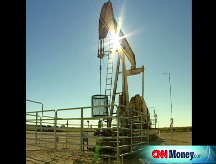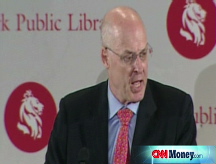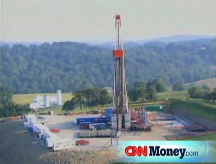Stocks end higher on sliding oil prices
Sinking crude futures and mounting expectations that the House will pass a mortgage relief bill encourage Wall Street, but a slew of mixed quarterly financial reports drag on gains.




NEW YORK (CNNMoney.com) -- Stocks finished higher Wednesday as investors cheered falling oil prices and waited to see if the House passed a bill that would support the struggling housing market.
"When you look at cheaper oil and better-than-expected earnings, there is the momentum at play," said Art Hogan, chief market strategist at Jefferies & Company. "Even when the market tries to sell off, it is rallying back to unchanged."
After churning on both sides of the unchanged mark throughout the day, the 30-stock Dow Jones industrial average (INDU) ended up nearly 0.3%. The tech-heavy Nasdaq composite (COMP) gained almost 1%, and the broader Standard & Poor's 500 (SPX) index was 0.4% higher.
Falling oil prices supported the markets, according to Peter Cardillo, chief market economist at Avalon Partners. Also contributing were expectations that the House could pass a bill that would support the struggling housing industry.
"It is adding some optimism that maybe the housing market can begin to stabilize and that would be quite helpful in terms of economic activity," said Cardillo.
Another analyst, however, looked at the stock market gains on Wednesday with more caution.
The markets have been struggling since early July, when all three major indexes fell into bear market territory. A bear market is defined as a drop of at least 20% off the most recent cyclical highs, which the indexes had hit in October.
"You have to be careful with a bear market rally," said Joe Clark, market analyst with the Financial Enhancement Group. "When you have been hit with bad news after bad news after bad news, less of a loss can be interpreted as a positive for a while," he said, but that is only temporary.
Clark said a bear market rally does not last the way a rally can in times of economic health.
"That does not mean that bear market rallies die quickly, but I would be more cautious than optimistic going into the [November presidential] election," he said.
Market breadth was positive. On the New York Stock Exchange, advancers beat decliners by 2 to 1 on a market volume of 1.72 billion shares. On the Nasdaq, advancers beat decliners by 4 to 3 on a volume of 2.73 billion shares.
Oil: Oil prices continued to decline Wednesday, after a government report showed stronger-than-expected inventories and a Federal Reserve report showed a weakening economy. Light, sweet crude for September delivery fell $3.98 to settle at $124.44 a barrel on the New York Mercantile Exchange, the lowest close since June 4. (Full story).
Gasoline prices fell for the 6th straight day Wednesday, according to a nationwide survey by motorist advocacy group AAA. The average for regular unleaded gas fell more than a penny to $4.042 a gallon, down from $4.055 the previous day. (Full story).
Housing bill: The House was ready to pass new legislation that will offer up to $300 billion in assistance to troubled homeowners and throw government support behind mortgage finance giants Fannie Mae (FNM, Fortune 500) and Freddie Mac (FRE, Fortune 500). It is expected that the House will approve the nearly 700-page measure and then it would then go back to the Senate for a final vote. (Full story).
President Bush dropped his threat Wednesday to veto the housing bill. (Full story).
Fed report: The Fed's 'beige book' on the economy highlighted the dual problems of weaker growth and higher prices, especially for energy. (Full story).
Company announcements: After the closing bell on Wednesday, the Seattle-based Web retailer Amazon.com (AMZN, Fortune 500) said profit increased 102% to $158 million in the second quarter, or 37 cents per share, compared with net income of $78 million, or 19 cents per share, in second quarter 2007. Analysts polled by Thomson Reuters were expecting earnings of 26 cents per share. (Full story).
Washington Mutual (WM, Fortune 500) reported a $3.3 billion quarterly loss late Tuesday, far worse than Wall Street was anticipating, as it set aside more money for bad loans. Yet, the company offered signs of encouragement as delinquencies in its troubled subprime and home equity portfolios showed "early signs of stabilization." Shares of Washington Mutual stock finished the day down 20%. (Full story).
Northwest Airlines (NWA, Fortune 500) reported a net loss for the second quarter, blaming the rising price of jet fuel for sending it into the red. Despite the loss, Northwest managed to beat analyst projections. The company's stock was up more than 15%. (Full story).
Internet search engine Yahoo (YHOO, Fortune 500) reported second-quarter results Tuesday that fell short of Wall Street's expectations as the company struggled with dwindling market share and softening economic conditions. Shares of the company's stock lost almost 5%. (Full story).
AT&T (T, Fortune 500) reported second-quarter earnings Wednesday that contained signs that the weak economy is catching up to its previously steady results, but investors were pleased. Shares of the company's stock were up 4%. (Full story).
Costco (COST, Fortune 500) warned Wednesday that its fiscal fourth-quarter earnings will fall well below the $1-a-share Thomson Financial analyst consensus estimate, as the warehouse club operator tries to hold prices down even as energy-related costs surge. The company's shares finished the session down nearly 12%. (Full story).
Other markets: In currency trading, the dollar hit a two-week high against the euro, and gained against the Japanese yen, as well. (Full story).
In the bond market, Treasury prices fell, sending yields higher. The yield of the benchmark 10-year note rose to 4.11%, up from 4.10% late Tuesday. (Full story).
COMEX gold for August delivery fell $25.70 to $922.80. ![]()





